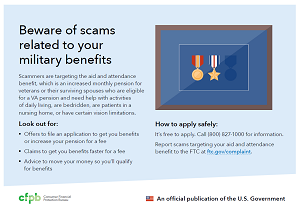Helping to prevent scams targeted at veterans
If you’re working with older adults, many of whom might be veterans, you might be looking for ways to educate them about the dangers of frauds and scams. We are offering a new placemat on scams targeting the Aid and Attendance benefit, part of a series of fraud and scam prevention placemats.
Veterans, or surviving spouses who are eligible for a veteran’s pension, may be eligible for the Aid and Attendance benefit. This benefit may be granted if the individual needs help with activities of daily living, is bedridden, is a patient in a nursing home, or has certain vision limitations. For those who qualify, the Aid and Attendance benefit is added to his or her VA pension. If you think you meet the criteria, use this fact sheet to learn more about how to apply for the Aid and Attendance benefit.
Look out for possible Aid and Attendance benefit scams
Veterans and spouses, look out for these signs of possible Aid and Attendance benefit scams:
- Offers to file an application to get you benefits or increase your pension for a fee
- Claims to get you benefits faster for a fee
- Advice to move your money so you’ll qualify for benefits
The Bureau’s latest fraud and scam prevention placemat on Aid and Attendance benefit scams is free to the public for bulk ordering. This placemat is part of a series of consumer education placemats that meal service providers deliver to homebound seniors and senior meal sites. Other groups that might be interested in distributing this placemat are veteran nursing homes, VA hospitals, veteran/military service organizations, faith-based organizations, and financial institutions.
Here are some ways you can protect yourself and your friends and family from Aid and Attendance benefit scams, and other types of elder abuse or financial exploitation:
- Place an order for the Aid and Attendance benefit scam prevention and awareness placemats and share with people in your community. The placemats can be used year-round to help educate older adults and others about these scams.
- Report any crimes to your law enforcement’s non-emergency number. If you suspect that someone is a victim of elder abuse or financial exploitation, report it to your local Adult Protective Services (APS) . If you think the person’s safety may be at risk, call 911.
- Report scams and financial abuse to your state attorney general .
- Report suspected scams to the Federal Trade Commission .
Contact the VA at 800-827-1000 if you have general questions about the Aid and Attendance benefit.

